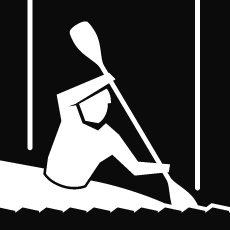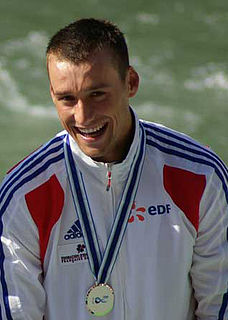
Canoeing is an activity which involves paddling a canoe with a single-bladed paddle. Common meanings of the term are limited to when the canoeing is the central purpose of the activity. Broader meanings include when it is combined with other activities such as canoe camping, or where canoeing is merely a transportation method used to accomplish other activities. Most present-day canoeing is done as or as a part of a sport or recreational activity. In some parts of Europe canoeing refers to both canoeing and kayaking, with a canoe being called an open canoe.

Canoe slalom is a competitive sport with the aim to navigate a decked canoe or kayak through a course of hanging downstream or upstream gates on river rapids in the fastest time possible. It is one of the two kayak and canoeing disciplines at the Summer Olympics, and is referred to by the International Olympic Committee (IOC) as Canoe/Kayak Slalom. The other Olympic canoeing discipline is canoe sprint. Wildwater canoeing is a non-Olympic paddlesport.

Canoeing at the 2004 Summer Olympics was held at the Schinias Olympic Rowing and Canoeing Centre for the sprint events and the Olympic Canoe/Kayak Slalom Centre at the Helliniko Olympic Complex for the canoe and kayak slalom disciplines. A total of 16 events were contested, 12 sprint events and 4 slalom events.
At the 1972 Summer Olympics in Munich, seven events in sprint canoe racing were contested, and for the first time at the Olympic Games, four events in slalom canoeing were also contested, at the Augsburg Eiskanal.

Štěpánka Hilgertová is a former Czechoslovak-Czech slalom canoeist who competed at the international level from 1988 to 2017. Competing in six Summer Olympics, she won two gold medals in the K1 event, earning them in 1996 and 2000.

Pavol Hochschorner is a Slovak slalom canoeist who has competed at the international level since 1996. Competing together with his twin brother Peter Hochschorner, they are the most successful C2 paddlers in the history of canoe slalom.

Peter Hochschorner is a Slovak slalom canoeist who has competed at the international level since 1996. Competing together with his twin brother Pavol Hochschorner, they are the most successful C2 paddlers in the history of canoe slalom.
Fabian Dörfler is a German slalom canoeist who competed at the international level from 2001 to 2014.

Maria Francis (Lund) is a British and Welsh slalom canoeist who competed in the 1980s and 1990s. She was women's K1 British Champion in 1989, silver medalist at the 1990 Europa Cup in Merano and went on to win a bronze medal in the K1 team event at the 1993 ICF Canoe Slalom World Championships in Mezzana.

The canoeing races at the 2012 Olympic Games in London were contested in two main disciplines: the slalom, from 29 July to 2 August, and the sprint, from 6 to 11 August. The slalom competition was held at the Lee Valley White Water Centre and the sprint events were staged at Eton College Rowing Centre, at Dorney Lake, known as Eton Dorney.

Denis Gargaud Chanut is a French slalom canoeist who has competed at the international level in C1 since 2004. Between 2009 and 2011 he also competed in the C2 category alongside Fabien Lefèvre. He won a gold medal in the C1 event at the 2016 Summer Olympics in Rio de Janeiro.

Peter Škantár is a Slovak slalom canoeist who has competed at the international level since 1998 along with his cousin Ladislav Škantár in the C2 class.

Hannes Aigner is a German slalom canoeist who has competed at the international level since 2006. He won a bronze medal in the K1 event at the 2012 Summer Olympics in London.

The ICF Canoe Slalom World Cup is an annual series of races in canoe slalom held under the auspices of the International Canoe Federation. It has been held since 1988 in four canoe and kayak disciplines for men and women. The four original disciplines were men's single canoe (C1), men's double canoe (C2), men's kayak (K1) and women's kayak. A women's single canoe discipline (C1) has been added to the world cup in 2010. The men's C2 event was removed from the world cup series in 2018 and it was replaced by the mixed C2 event. 2018 was also the first time that world cup points were awarded for the extreme K1 event.
The European Canoe Slalom Championships is an annual international canoeing and kayaking event organized by the European Canoe Association (ECA) since 1996. Until 2004 it was held every two years.

The canoeing races at the 2016 Summer Olympics in Rio de Janeiro were contested in two main disciplines: the slalom, from 7 to 11 August, and the sprint, from 15 to 20 August. The slalom canoe competition was held at the Olympic Whitewater Stadium; whereas the sprint events was staged at Lagoa Rodrigo de Freitas in Copacabana. The location for canoeing events was a source of concern for athletes since the Brazilian federal government's Oswaldo Cruz Foundation lab has found the genes of drug-resistant super bacteria in Rodrigo de Freitas lagoon.
The 2017 ICF Canoe Slalom World Championships was the 38th edition of the ICF Canoe Slalom World Championships. The event took place from 22 September to 1 October 2017 in Pau, France under the auspices of International Canoe Federation (ICF) at the Pau-Pyrénées Whitewater Stadium. Pau was also hosting the Wildwater canoeing world championships as part of the same event.
The European Junior and U23 Canoe Slalom Championships is an annual international canoeing and kayaking event organized by the European Canoe Association (ECA). The Junior Championships were first held in 1995 and then every two years until 2003. The Under-23 Championships were first held in 2002 as part of the senior championships that year. Since 2004 the junior and U23 age categories are held annually together as part of the same event. Athletes under the age of 18 are eligible for the junior category.
The 2019 ICF Canoe Slalom World Championships is the 40th edition of the ICF Canoe Slalom World Championships. The event takes place from 24 to 29 September 2019 in La Seu d'Urgell, Spain under the auspices of International Canoe Federation (ICF). The events is taking place at the Segre Olympic Park which also hosted the canoe slalom events at the 1992 Summer Olympics. La Seu d'Urgell is hosting the championships for the third time after previously hosting the event in 1999 and 2009













